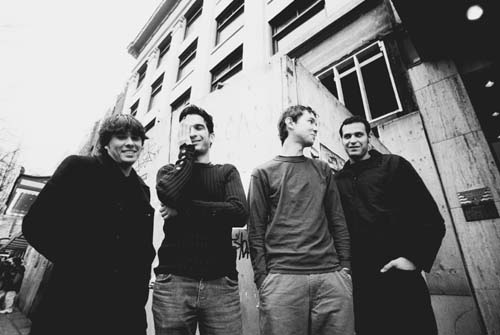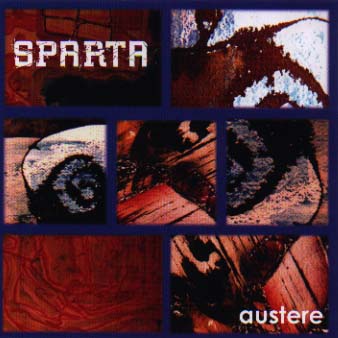|

Sparta:
Phoenix Without Ashes
story by tim mcmahan
|
|
|
Lazy-i: March 26, 2002
|
April 2
Sparta with Thursday and The Detachment Kit
The Ranch Bowl
1606 S. 72nd St.
$9 adv., $11 dos.,
All ages
|
|
|
It's
hard to explain just how high a precipice At the Drive In was leaning
over when everything, out of the blue, just sort of stopped.
By November 2000, the
El Paso-based 5-piece had emerged from a pack of faceless indie
rock bands as perhaps the first "breakthrough" act since
Nirvana. In addition to being lauded for their CD, Relationship
of Command, At The Drive In had earned a reputation for their
high-octane, over-the-top live shows that featured their own brand
of punk composed of equal parts Jane's Addiction, Chavez, Fugazi
and bottled-up anger. MTV caught on. So did radio and mainstream
television. The twin afros of Cedric Bixler and Omar Rodriguez were
the ultra-cool trademarks of a band that could do no wrong.
Then, four months later,
At the Drive In was gone.
No one knew for sure
why a band that had stuck together through thick and thin -- mostly
thin -- had announced it was going on an "extended hiatus"
just as they were on the verge of breaking through to widespread
commercial success. Some blamed band in fighting. Others said it
was a stereotypical Freddie Prinze-style burn-out that comes from
getting too big too fast. Still others said the endless touring
of sold-out club shows ultimately took its toll.
Former At the Drive In
bassist Paul Hinojos discounts all of the inane theories. "We
didn't burn out," he said from the House of Blues studio in
Los Angeles, where his new band, Sparta, is finishing recording
their full-length debut before heading out on a tour that brings
them to The Ranch Bowl April 2 in support of their just-released
EP, Austere.
"We were all perfectly
happy. We even planned on increasing our touring," Hinojos
said. "It was just one of those things. We had set a rule in
the band that if we're ever going to break up, we would immediately
go on hiatus and talk again in a few months. That's what happened.
We went on hiatus in March and we waited it out to see if we'd stay
a band. It just didn't happen. We just left it the way it was and
walked away. Now we're totally focusing on Sparta, and At the Drive
In is gone."
|
|
|
Like
a proverbial phoenix, Hinojos and two other former At the Drive
In members -- Jim Ward and drummer Tony Hajjar -- formed Sparta
with friend Matt Miller. "I was in Los Angeles in June, hanging
out with Tony in a parking lot, and we said we should play together
again," Hinojos said. "We went to El Paso and asked Jim,
and he said 'yeah,' and then brought on Matt to play bass -- I switched
to guitar. We started practicing and rehearsing in July. Having
been apart for a few months, we all had some new ideas, and when
we came to practice all these songs just came out."
The half-dozen or so
songs were recorded in 10 days and immediately made their way to
the Internet, where they caught fire. Though never officially released,
those demos have been rerecorded and could reemerge on the band's
upcoming full-length. A down-and-dirty 11-show tour was hastily
thrown together that took Sparta from Texas to Reykjavik, Iceland.
The response was immediate and overwhelming, Hinojos said.
Among those taking notice
was major label Dreamworks Records, who knew a winner when they
saw it and signed the band. Out of the blocks, Hinojos and Ward
wanted to put out an EP on Restart Records, a label they started
while on tour with At The Drive In with the goal of helping out
other El Paso-area bands. "Dreamworks was fine with putting
Austere out on our label," Hinojos said. "We ended
up putting it out together as a joint release, which really helps
to get it into stores."
Without Bixler and Rodriguez,
who went on to form Mars Volta, Ward moved to lead vocals and guitar,
while Hajjar continued to man the drum set. The change in instrumentation
was a breath of fresh air for Hinojos, who said guitar was always
his first instrument. "I'd always played guitar at home and
just wanted to try it on stage," he said. "It's challenging
to me. Playing live is totally different than playing in your bedroom.
I'm learning a lot of new things and it's a new way for me to put
down my ideas."
Hinojos said writing
for Sparta isn't much different than writing for his former band.
"With At the Drive In, everyone had an equal part in saying
if something sucked or was good," he said. "We wanted
to keep the same formula and equalness."
Having Ward as the frontman,
however, is different. "Jim's voice is really strong,"
Hinojos said. "He sang a lot of the choruses in At the Drive
In. Now he's taking the lead position and it's really cool. Watching
him blossom really motivates all of us."
|

|
"We
just left it the way it was and walked away. Now we're totally
focusing on Sparta, and At the Drive In is gone."
|
|
|
|
"A
lot of people are curious if we'll be the same as At the Drive
In. When the CD comes out and people hear it and see us play
live, a lot of that curiosity will go away."
|
|
|
The
similarities and differences between the two bands are obvious the
first time you listen to Austere. Both sport a heavy, bass-and-guitar-driven
sound accented by wide-open, almost Perry Farrell-style vocals.
But compared to At the Drive In, Sparta's music is less dense, less
chaotic and more, well, musical. If At the Drive In's music is like
an unexpected car crash, Sparta's is the startling aftermath.
Hinojos said the comparisons
to At the Drive In are both inevitable and expected. "We kind
of know it's coming," he said. "We don't get pissed about
it. We played in that band for so long. A lot of people are curious
if we'll be the same as At the Drive In. When the CD comes out and
people hear it and see us play live, a lot of that curiosity will
go away."
So, could Sparta reach
the same high precipices where At the Drive In was poised just prior
to their breakup?
"When we were with
At the Drive In, everyone used to ask us what the goal was,"
Hinojos said. "The only goals we set were to play music live
and make records, whether we were playing in front of five people
and selling five records out of our garage or playing arenas and
being on a major label. We were always happy with where we were.
It was a constant high point of being able to play music and have
fun. We always said we would play music until it wasn't fun anymore.
The band just ran its course and it was done and we broke up, but
it was a constant high right up to the end.
"With Sparta, we
just want to tour and put out records and make friends. We're having
fun and want to keep it that way. We're just a rock band and want
to make music."
Back to 
Published in The Omaha Weekly March 27, 2002. Copyright © 2002
Tim McMahan. All rights reserved.
|
|
| |
|
|
|

![]() webboard
interviews
webboard
interviews